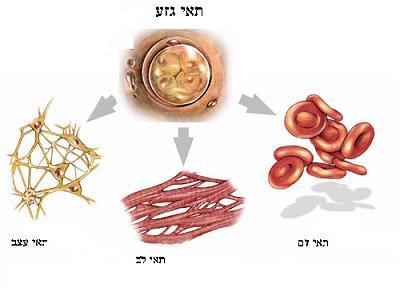This discovery has significant implications for stem cell research and its medical applications.

Researchers from the Hebrew University Discover the mechanism by which embryonic stem cells become mature cells that can develop to specific tissues. This discovery has significant implications for stem cell research and its medical applications.
All the cells in the body of an embryo that is in very early stages of development are identical, and unlike the cells of adults, they are "flexible", that is, able to develop into any type of tissue. The differentiation process of the stem cells begins more or less at the time the embryo begins to settle in the uterus. In order for this process to begin, two mechanisms need to operate: one mechanism "turns off" the genes that are supposed to keep the embryo in a state of potential change, and the second mechanism "turns on" the genes that direct the cells to develop into a certain tissue. Each set of genes that are turned on is responsible for creating a different tissue: when a certain set is activated, the fetus produces muscle tissue, and when another set is activated, it produces a liver.
In an article recently published in the journal "Nature Structural and Molecular" Prof. Yehudit Bergman and Prof. Haim Sider deciphered, Winner of this year's Wolf Prize for Medicine from the School of Medicine at the Hebrew University the mechanism by which embryonic stem cells are transformed into mature cells that can develop into specific tissues. In experiments conducted by the two in the embryos of laboratory mice and in cells grown in culture, it became clear that the entire mechanism is controlled by a single gene called G9a. This gene permanently turns off the genes that are responsible for maintaining the transformation potential of the stem cells, thus preventing the cells' ability to change.
Prof. Cedar and Bergman's discovery may have significant medical consequences. One of the biggest challenges facing medicine today is the production of new tissues to replace tissues whose cells have been damaged as a result of diseases such as Parkinson's or diabetes. For this purpose, many efforts are invested in various attempts to "reprogram" mature cells. However, researchers have discovered that it is very difficult to achieve this goal, because adult cells are "locked", that is, they lack the special flexibility of embryonic cells. Now, thanks to the deciphering of the mechanism responsible for "locking" the cells and eliminating their flexibility, there will be new approaches to reprogramming cells so that they become the required tissues.

8 תגובות
but:
It is not certain that the process is reversible.
Well, but it's worth a try, isn't it?
Well... doesn't such a discovery deserve a Nobel Prize?
"biologist":
People who have had their kneecap removed are able to stand.
People with kneecaps are more stable than them.
You did not understand?
Not bad.
It's not really something surprising - the hypothesis was like that from the beginning.
And how did it develop evolutionarily? How is the degree possible if genes are required for this, without which the cells will continue to develop?
A single gene is responsible for this entire locking mechanism? strange.
It is not certain that the process is reversible.
Wonderful news.